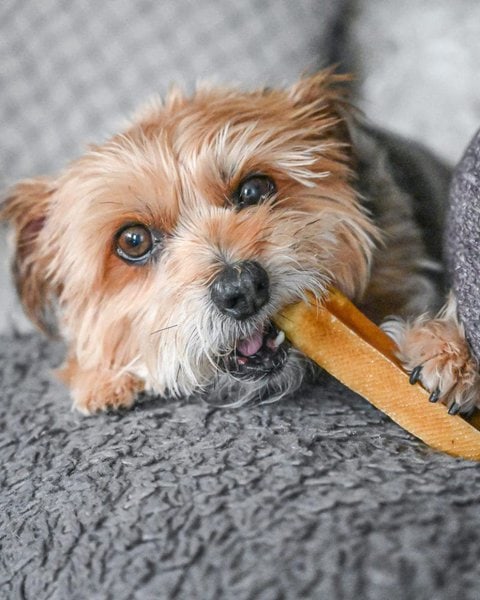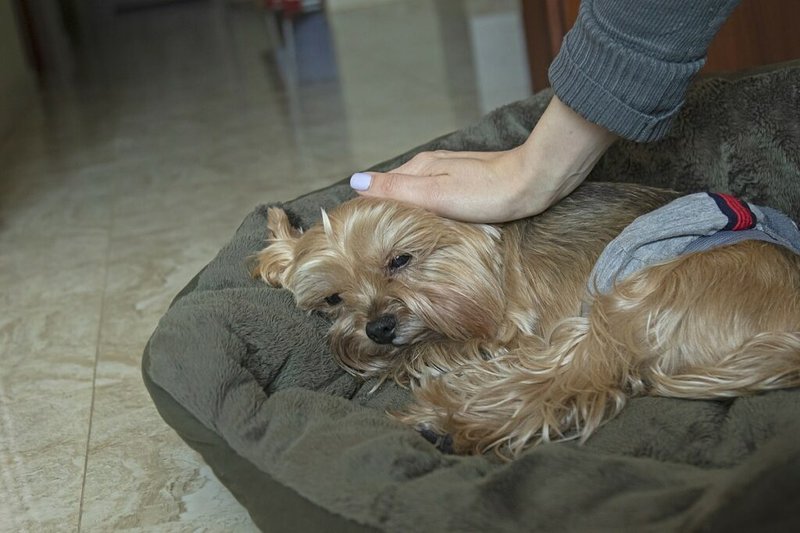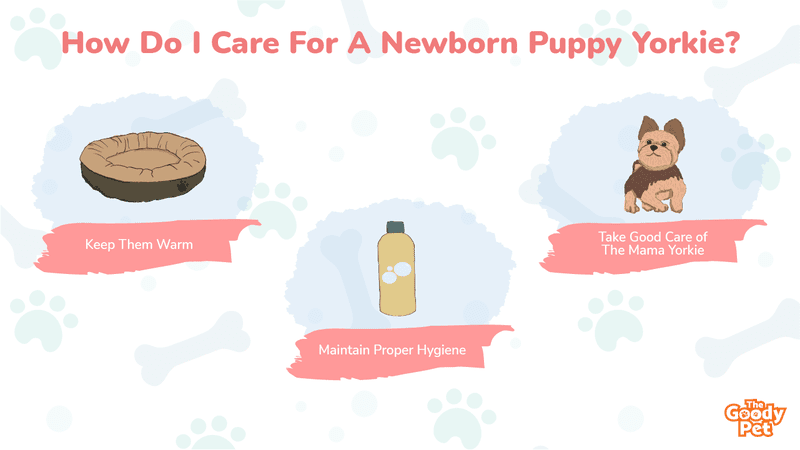Congratulations on the birth of your newborn Yorkie puppy! If you are a new pet parent, we know how scary it can be to care for these small pups. That’s why we have come up with this comprehensive guide for you.
How do I care for a newborn Yorkie puppy? The key steps to take care of newborn Yorkies include keeping them safe in an enclosed area, providing them with warmth at all times, practicing good hygiene, etc. In addition, to ensure your Yorkshire Terrier puppy can grow healthily, be sure to feed them with nutritious dog food.
In our guide, we will go through the do’s and the don’ts to properly care for your newborn Yorkshire Terrier puppies. This applies to all Yorkies, including the Parti Yorkies and the Biewer Yorkies.
How Do You Take Care Of A Newborn Yorkie?
Newborn Yorkies are really delicate creatures due to their small size, although, ironically, it is the best time to dock their tails as the sensation of pain is not strong. How you treat them when they are this young determines everything from their health to their personality traits.
To help you out, here are five must-dos with newborn Yorkie pups:
#1: Keep Them Warm
Newborn Yorkies tend to get cold easily as a result of their surface area to volume ratio and their light fur cover. You may have to intervene, in which case the Lightter Pet Heating Pad is a fantastic product to check out. The soft and waterproof pad uses intelligent temperature control technology to keep the puppies and their mom nice and warm.
#2: Monitor Their Feeding
As newborns, the pups will rely primarily on their mother for nutrition during breastmilk. All you can do as the owner is to monitor this and ensure that no one is getting a raw deal- and if a pup seems to be having a poor appetite, it could be a sign that something is wrong.
Newborn puppies do not have teeth. Hence, make sure to feed them soft food and treats that they can swallow without having to chew. We will examine the food that they can eat in a bit.
#3: Allow Them To Explore Their Environment
As they grow older, these little bundles of Yorkie joy settle into their playful and curious personalities. The Furhaven Pet Playpen would be very handy to have in such cases. The portable mesh setup allows the little one some freedom of movement and can be used in different indoor and outdoor spaces to satisfy their curiosity.
Note that this may not be the best time to potty train your puppies as they are probably too young to understand your cues and the concept of dog treats. To prevent potty accidents, you may consider getting puppy pee pads in the meantime.
#4: Maintain Proper Hygiene
Young Yorkies have very weak immune systems and are vulnerable to developing skin infections. They may tend to get stinky as well without the proper grooming care.
Ensuring they are well-groomed is therefore very important. When they outgrow their mom’s lick-cleaning, you will have to take over in which case the Alpha Dog Series Tear Free Puppy Formula Shampoo is your best friend. In addition to the thorough cleaning, odor elimination, and hair conditioning, your pup gets to enjoy antibacterial cover from the shampoo.
A good thing to know is that puppies only start shedding at about 4 to 6 months. Hence, there’s no need for brushing until then. And, of course, any teddy bear cuts will have to wait a bit longer for the hair to grow long enough for styling.
#5: Take Good Care of The Mama Yorkie
Truly, the best way to take care of a newborn Yorkie pup is by taking care of their mother. Watching her diet during pregnancy gives her ample rest and comfort. Ensure that she is well fed, adequately hydrated, clean, and generally happy.
A healthy mom will raise healthy pups and live a long and healthy life. She will have no problems entering another heat cycle and giving birth to more Yorkie puppies successfully!
Yorkie Puppy Feeding Guidelines – How Much Food Do You Give A Yorkie Puppy?
Yorkie pups survive exclusively on breastmilk until about 4 weeks.
After this stage, you can start to slowly transition to more solid foods. This should be a slow and closely monitored process because of the breed’s, particularly sensitive gut.
The secret is to get them high-quality food and to get the frequency and volume just right.
When it comes to quality, you will never go wrong with brands specifically formulated for small breed puppies like this one. In this case, PetAg Esbilac 2nd Step Puppy Weaning Food is an excellent transition option. The beef and milk cereal formulation is designed for pups between 4 and 8 weeks.
Frequency and volume are also important factors to consider when feeding a Yorkie puppy. As they grow older, they get more playful. This eats into their energy reserves (pun intended) and leaves them at risk of common Yorkie complications like hypoglycemia. On the other hand, if they are allowed to eat too much or too often, they may develop obesity.
While they are weaning, free-feeding is the way to go. Here, just ensure they get at least ⅓ of a cup of puppy food every day. Leave it out where they can reach it, and they will feed on demand.
As they grow older, start to introduce a feeding schedule with 3 to 4 meals per day totaling between ⅓ and ½ cups of food on a daily basis. The schedule will teach them discipline, keep them sufficiently energized, and prevent obesity.
What Do You Do If Your Yorkie Puppy Won’t Eat?
This could be as a result of anything from illness-causing poor appetite to them not liking the food. First, try and switch things up with new puppy food. If this doesn’t work, take the dog to a vet.
What Should I Not Feed My Yorkie?
The only thing Yorkies love more than playing is eating. The worst part is that they will literally eat anything they can find or are given to them if they are not properly trained. While the fact that they are not fussy eaters does make your life easier, the Yorkie’s health does not always benefit from the habit.
Some foods they ingest cause short term health consequences. These could be as simple as an upset tummy or as serious as diarrhea and vomiting. Common culprits in this case include foods like raw meat and eggs, onions, and garlic.
In other situations, the problem is caused by allergic reactions to the food. In this case, the most common culprit is gluten. This can be found in many dog food brands and human food like bread and pasta that you feed your Yorkie. If you notice issues like diarrhea, vomiting, or loss of appetite related to feeding time, you may want to switch to grain-free dog food.

Another group of foods you should never feed your Yorkie is those that cause long-term complications. The best example here is that of grapes and raisins. These have been shown to cause kidney toxicity and subsequent failure with time.
Finally, there are foods that you should not feed your Yorkie purely for mechanical reasons. These dogs have small mouths and teeth as well as weak jaws. Things like large kibble and chicken bones are therefore a huge no-no. The kibbles may cause the little one to choke while the bones are at risk of gut perforation.
This is especially critical if your Yorkie is a Teacup Yorkie. These miniature versions of Yorkies have a much smaller mouth, so you will have to get dog foods with even smaller-sized kibble to feed them.
How Long Should Yorkie Puppies Stay With Their Mother?
The relationship between Yorkies and their pups is genuinely heartwarming. There is truly nothing that the moms will not do for their little ones. Unfortunately, they will at some point have to be separated as they head off to their new homes and families. The timing of this separation is absolutely crucial for the physical and mental health of the doggy.
In order to get why timing is important, you have to appreciate what the mom does for her pups. For the first few weeks of their lives, Yorkies depend on their mothers for everything. This includes food, warmth, grooming, and general protection, just to name a few. When they are between 6 to 8 weeks, they start to explore and slowly work their way up to independence.
It is therefore often recommended that Yorkie puppies stay with their mothers at least up to 12 weeks.
By this time, the little one is no longer so desperately vulnerable that they need their mothers to care for everything. They are strong enough to move around. They are usually already weaned off breastmilk- and their metabolic and immune systems are strong enough to handle the big scary world.
So what happens if they are taken from their mother too early? The answer is a mix of health and behavioral problems.
If taken away as early as 6 weeks or less, newborn Yorkie puppies are more vulnerable to developing health complications.
These include poor nutrition, infections, and overall stunted growth. Matured pups over six weeks may become a little stronger, but their psyche takes a huge hit. These doggies often end up developing behavioral issues like anxiety or even aggressiveness that is uncharacteristic of Yorkies.
Learn To Read The Danger Signs – How Do You Know If A Newborn Yorkie Puppy Is Dying?
Newborn Yorkie puppies are vulnerable to all sorts of dangers, from malnutrition and trauma to infections and death from congenital anomalies. Unfortunately, they cannot verbally complain if they feel unwell, so it is up to you as the owner to look out for warning signs. Here are a few signs that point to a really sick Yorkie:

Poor Breastfeeding
Yorkies love to eat even when they are newborns. It is thus very unusual to find a pup unwilling to feed. This is usually a sign of problems with their gut or infections that cause a reduction in appetite. Whatever the case, it should be addressed quickly to avoid the complications that come with malnutrition.
Poor Coat Health
A newborn Yorkie usually has a fine and even dark coat. If there are any abnormalities like missing patches of hair, odd discoloration, or visible skin lesions, it could be a sign of skin infections. This is usually a result of poor hygiene conditions around the puppy.
Obvious Anomalies
Yorkies suffer from several genetic anomalies. Some, fortunately, are more evident than others and therefore easier to deal with early. The best examples here include cleft defects of the mouth that often negatively impact nutrition.
Frequent Fainting Spells And Difficulties Breathing
Heart defects may not be visible, but their effects often are. The sometimes fatal group congenital anomalies present with issues like fainting spells, blue discoloration of the tongue, and difficulties in breathing, especially when breastfeeding.
Restricted Movement
With a vigilant mom on the lookout, trauma is easily avoidable. However, some puppies still get hurt in one way or another. The easiest sign of this is restricted movement. While this may not directly cause death, complications like malnutrition and increased risk of infection may spell doom for the little one.
Related Questions
How Long Before Yorkie Puppies Open Their Eyes? It takes anywhere between 2 to 4 weeks for a newborn Yorkie to fully open its eyes. This gives the nerves and other eye structures time to fully develop and prepare for their job. After the eyes open, it takes two further weeks for the eyes to adapt to the environment and a complete sense of sight to kick in.
How Big Are Yorkies At Birth? Yorkshire Terriers are nothing more than little bundles of fur when they are born. Yorkies usually weigh between 2.5 to 5 ounces at birth, depending on the bloodline and the mother’s overall health status. After this, they undergo a rapid growth spurt for the next few months before settling into their mature sizes at about 12 to 18 months.
Are Puppies Sad When They Leave Their Mom? Yorkie pups and moms have very strong bonds. It goes way beyond the physical dependence the little ones have for survival. They develop social attachments not only to their mothers but also to their siblings in the litter. When separated too early, these puppies may develop psychological issues like anxiety and tend to bark more frequently. However, by 12 weeks, they are independent and curious enough to get over the separation faster.





